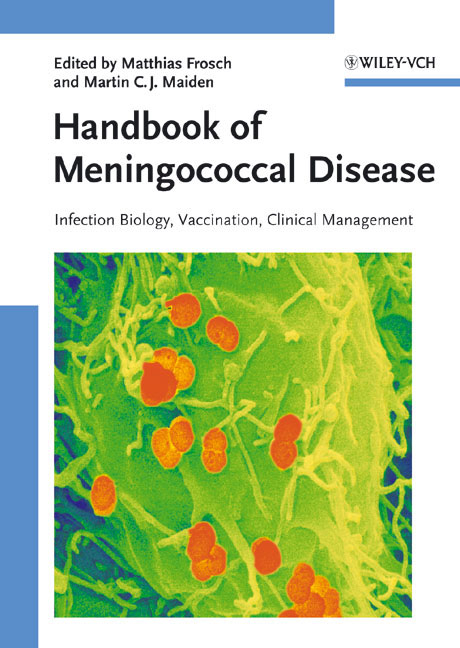
Handbook of Meningococcal Disease
Wiley-VCH (Verlag)
978-3-527-31260-3 (ISBN)
- Titel ist leider vergriffen;
keine Neuauflage - Artikel merken
As such, this is the first volume to summarize the implications of the meningococcus genome-sequencing project, emphasizing the novel strategies in vaccine development. Following a look at the history, the authors go on to treat the epidemiology of meningococcal disease, as well as the genetics, structure and function of virulence factors. Further chapters cover cross-talk between meningococci and host cells, genomics and immunobiology.
The result is a standard textbook for all scientists working in the field. While aimed at advanced specialists in basic research, epidemiologists, public health workers, vaccine developers and clinicians, the book is equally appropriate as introductory reading for graduates embarking on their carrier in this field.
After his MD thesis in medical microbiology Matthias Frosch continued his career from 1986 to 1994 first as a post-doc at the Max-Planck-Institute for Biology in Tübingen and as a group leader at the Medical School Hannover where he became Professor in 1994. Since 1996 Matthias Frosch is director of the Institute for Hygiene and Microbiology at the University of Würzburg. By order of the Robert-Koch-Institute he was appointed head of the German national research center for Meningococcal Diseases in 2002. Martin Maiden is Professor of Molecular Epidemiology, and Wellcome Trust Senior Research Fellow in the Department of Zoology, University of Oxford. After obtaining his degree at Reading University, he began his research career at the University of Cambridge where he took his PhD degree. Following a Medical Research Council Training Fellowship in the same laboratory, he moved to the National Institute for Biological Standards and Control in Hertfordshire including a sabbatical at the Max-Planck-Institute for Molecular Genetics in Berlin. He moved to Oxford in 1997 and is a Fellow of Hertford College. His current research focuses on antigenic diversity and its relationship to genetic diversity in populations of microorganisms, especially Neisseria meningitidis and Campylobacter jejuni.
Historical Aspects
EPIDEMIOLOGY OF MENINGOCOCCAL DISEASE
Population Structure of the Meningococcus and Epidemiology of Meningococcal Carriage and Disease
Methods for Typing of Meningococci
Antibiotic Resistance
GENETICS AND GENOMICS OF THE MENINGOCOCCUS
Neisseria Meningitidis Genome Sequencing Projects
Phase Variation and Adaption
Transformation and DNA Repair
Genetics, Structure and Function of Capsule
Genetics, Structure and Function of Lipopolysaccharide
Genetics, Structure and Function of Major Outer Membrane Proteins
Iron Metabolism in Neisseria Meningitidis
Genetics, Structure and Function of Pili
INFECTION BIOLOGY
Mechanisms of Attachment and Invasion
Role of Complement in Defense Against Meningococcal Infection
Immune Responses in Meningococcal Disease
Genetics of Host Response to Meningococcal Infection
DEVELOPMENT OF VACCINES
Surrogates of Protection
Conjugate Vaccines
Outer Membrane Vesicle Based Meningococcal Vaccines
Genome Mining and Reverse Vaccinology
Vaccination for the Control of Meningococcal Disease: The Use of Meningococcal Vaccines from the Public Health Perspective
CLINICAL AND PUBLIC HEALTH MANAGEMENT
Pathogenesis and Pathophysiology of Invasive Meningococcal Disease
Clinical Course of Disease, Treatment and Clinical Management
Public Health Management
| Sprache | englisch |
|---|---|
| Maße | 170 x 240 mm |
| Gewicht | 1230 g |
| Einbandart | gebunden |
| Themenwelt | Naturwissenschaften ► Biologie ► Mikrobiologie / Immunologie |
| Schlagworte | Immunologie • Meningokokken • Mikrobiologie |
| ISBN-10 | 3-527-31260-9 / 3527312609 |
| ISBN-13 | 978-3-527-31260-3 / 9783527312603 |
| Zustand | Neuware |
| Haben Sie eine Frage zum Produkt? |
aus dem Bereich


